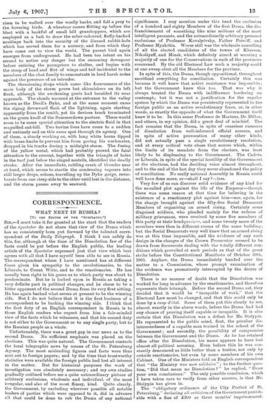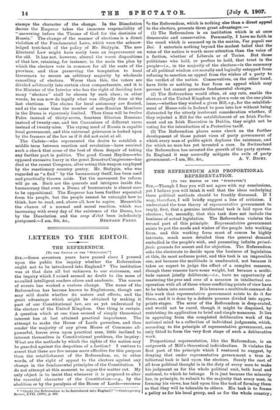CORRESPONDENCE.
WHAT NEXT IN RUSSIA?
[To TED EDITOR OP THR .SPECTATOR.1
must take it for granted at the start that the readers of the Spectator do not share that view of the Duma which has so consistently been put forward by the talented corre- spondent of the Daily Telegraph. I think I can safely do this, for, although at the time of the Dissolution few of the facts could be put before the English public, the leading article of the Spectator expressed just that view which best agrees with all that I have myself been able to see in Russia. The correspondent whom I have mentioned has at different times given his sympathy to the revolutionaries, to the Liberals, to Count Witte, and to the reactionaries. He has usually been right in his guess as to which party was about to predominate. But he is looked upon in Russia as taking a very definite part in political changes, and he chose to be a bitter opponent of the second Duma from its very first sitting. He has again backed what seems at present to be the winning side. But I do not believe that it is the first business of a correspondent to be backing the winning side. I think that the first duty of an English correspondent in Russia is to those English readers who expect from him a fair-minded view of the facts which be witnesses, and that his second duty is not either to the Government or to any single party, but to the Russian people as a whole.
Unfortunately, there was a great gap in our news as to the second Duma. No sufficient emphasis was placed on the elections. This was quite natural. The Government controls the local telegraphic news by means of the St. Petersburg Agency. The most misleading figures and facts were thus sent out to foreign papers; and by the time that trustworthy statistics were available the foreign public had lost all interest in the matter. But for historical purposes the work of investigation was absolutely necessary; and my own studies gradually outlined before me a quite extraordinary picture of arbitrary exclusions, wholesale and individual, of the most irregular, and also of the most flimsy, kind. Quite clearly, the Government, by excluding wherever possible all notable leaders of parties which were opposed to it, did in advance oll that could be done to rob the Duma of any national significance. I may mention under this bead the exclusion of a hundred and eighty Members of the first Duma, the dis- franchisement of something like nine millions of the most intelligent peasants, and the extraordinarily arbitrary personal exclusions of Professor Kovalyevsky, Father Petroff, and Professor Myak6tin. Worse still was the wholesale cancelling of all the elected candidates of the towns of Klierson, Nikohlyeff, and Minsk, which definitely aimed at securing a majority of one for the Conservatives in each of the provinces concerned. By the old Electoral Law such a majority could at one sweep elect all the Members for the province.
In spite of this, the Duma, though oppositional, throughout sacrificed everything for conciliation. Certainly this was because it well knew that active resistance was impossible ; but the Government knew this too. That was why it always treated the Duma with indifference bordering on contempt; but it was not a justification for the regular system by which the Duma was persistently represented to the foreign public as an active revolutionary force, or, in other words, as exactly the opposite of what the Government itself knew it to be. In this sense Professor de Martens, Dr. Dillon, and others, in my opinion, did a great deal of mischief. The fact remains that the Duma, in spite of ceaseless rumours of dissolution from well-informed official sources, and in spite of active provocation of many other kinds, did not actually pass a single revolutionary resolution, and at every critical vote chose that course which, within the limits of its mandate from the electors, was least likely to be displeasing to the Government. The Cadets, or Liberals, in spite of the special hostility of the Government at the elections, had the deciding voice almost throughout, and to the end of the last day they never abandoned the policy of conciliation. No really national Assembly in Russia could well have done more, or—shall I say ?—less.
Very few of us can discover solid evidence of any kind for the so-called plot against the life of the Emperor—though there was some reason at that time for believing in the existence of a reactionary plot against him—nor, again, for the charge brought against the fifty-five Social Democrat Members of organising an armed rising. Certainly some disguised soldiers, who pleaded mainly for the redress of military grievances, were received by some five members of this party at their headquartcn:, and some twenty more of the members were then in different rooms of the same building; but the Social Democrats very well knew that an armed rising was at this time impossible, and the evidence of any such design in the charges of the Crown Prosecutor seemed to be drawn from documents dealing with the totally different con- ditions which prevailed at such periods as that of the great strike before the Constitutional Manifesto of October 30th, 1905. Anyhow, the Duma immediately handed over the matter to a Commission, whose prompt examination of the evidence was prematurely interrupted by the decree of Dissolution.
There is no manner of doubt that the Dissolution was worked for long in advance by the reactionaries, and therefore represents their triumph. Before the second Duma sat, they decided that it would be "incapable of work," that the Electoral Law must be changed, and that this could only be done by a coup d'etat. Some of them put this clearly to me, almost exactly in the above words, before the Duma had had any chance of proving itself capable or incapable. It is also certain that the Dissolution was a defeat for Mr. Stolypin. He represented to the public mind, first, the peculiar dis- interestedness of a capable man trained in the school of the Government ; and secondly, the possibility of compromise between the Government and the Duma. As lie has retained office after the Dissolution, his name appears to have lost almost all political meaning. Even before this he was con- stantly denounced as little better than a traitor, not only by outside reactionaries, but even by some members of his own Cabinet. One of the Ministers told an English correspondent that "the Ministry was now solidaire" ; to the further ques- tion, "Did that mean no Dissolution ? " he replied, "Draw your own conclusions." The only possible conclusion, which I have taken care to verify from other sources, is that Mr. Stolypin has given in. The "obligatory ordinance of the City Prefect of St. Petersburg," declaring all criticism of the Government punish- able with a fine of £300 or three months' imprisonment.
stamps the character of the change. In the Dissolution decree the Emperor takes the immense responsibility of "answering before the Throne of God for the destinies of Russia." The change of the manner of elections is a direct violation of the Fundamental Laws, which were the acknow- ledged text-book of the policy of Mr. Stolypin. The new Electoral Law might have easily been an improvement on the old. It has not, however, altered the worst dispositions of that law, retaining, for instance, in the main the plan by which the electors vote in common for all the seats of the province, and thus preserving the temptation to local Governors to secure an arbitrary majority by wholesale cancelling of electors. Worse than this, the voters are divided arbitrarily into certain class compartments, and it is the Minister of the Interior who has the right of deciding bow many " electors " shall be chosen by each class ; in other words, he can now do legally what was illegally done at the last elections. The claims for local autonomy are flouted, and at the same time the number of non-Russian Members in the Duma is rigorously limited. Thus there will be twelve Poles instead of thirty-seven, fourteen Siberian Russians instead of twenty-one, and ten Caucasians of different races instead of twenty-nine. The crying need of Russia is capable local government, and this universal grievance is looked upon by the framers of the law as if it did not exist at all.
The Cadets—who represented the desire to establish a middle term between reaction and revolution—have received such a check that some of the best of them despair of taking any further part in politics. The good Count Heyden—who opposed excessive hurry in the great Zemstvo Congresses—has died at the recent Congress, after seeing this weapon employed by the reactionary country gentry. Mr. Stolypin, who was regarded as "a find" by the bureaucracy itself, has been used and practically thrown aside. Yet the movement for reform will go on. Such are the quarrels and intrigues inside the bureaucracy that even a Duma of bureaucrats is almost sure to be oppositional. The Emperor has been further separated from his people, but the people cannot be untaught how to think, how to read, and, above all, how to aspire. Meanwhile the chance of a normal and moral reaction, which was increasing with every day of the existence of the Damn, has by the Dissolution and the coup d'etat been indefinitely















































 Previous page
Previous page